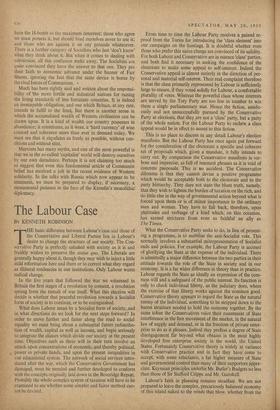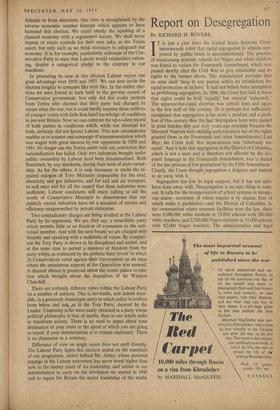The Labour Case
THE basic difference between Labour's'case and those of the Conservative and Liberal Parties lies in Labour's desire to change the structure of our society. The Con- servative Party is perfectly satisfied with society as it is and frankly wishes , to preserve the status quo. The Liberals are generally happy about it, though they may wish to inject a little mild reformation here and there or to correct what they regard as illiberal tendencies in our institutions. Only Labour wants radical change. From time to time the Labour Party, receives a pained re- proof froth the Tories for introducing the 'class element' into our campaigns on the hustings. It is doubtful whether even those who prefer this naive charge are convinced of its validity. For both Labour and Conservative are in essence 'class' parties. and both find it necessary in seeking the confidence of the electorate to make some appeal to self-interest. Indeed the Conservative appeal is almost entirely in the direction, of per- sonal and material self-interest. Their real complaint therefore is that the class primarily represented by Labour is sufficiently large to ensure, if they voted solidly for Labour, a comfortable plurality of votes. Whereas the powerful class whose interests are served by the Tory Party are too few in number to win them a single parliamentary seat. Hence the fiction, assidu- ously and not unsuccessfully pursued by the Conservative Party at elections, that they are not a `class' party, but a party of the whole nation. For the Labour Party to eschew a class appeal would be in effect to assent to this fiction.
This is no place to discuss in any detail Labour's election manifesto. But the Labour Party has once again put forward for the consideration of the electorate a specific and coherent set of proposals which, given a mandate, it fully intends to carry out. By comparison the Conservative manifesto is ver- bose and imprecise, as full of resonant phrases as it is void of concrete proposals. This is no accident. The Conservative dilemma is that they cannot devise a positive programme which would be acceptable both to the electorate and to the party hierarchy. They dare not state the blunt truth, namely, that they wish to lighten the burden of taxation on the rich, and do little else in the way of governmental action beyond what is forced upon them or is of minor importance to the ordinary man and woman. They have to fall back, therefore, upon platitudes and verbiage of a kind which, on this occasion. has earned strictures from even so faithful an ally as The Times. Atlantic or from elsewhere. Our view is strengthened by the adverse economic weather forecast which appears to have hastened this election. We reject utterly the equating of a planned economy with a regimented society. We shall never impose or retain controls for their own sake, as the Tories assert; but only such as we think necessary to safeguard our economy. It is, for example, particularly dishonest of the Con- servative Party to state that Labour would reintroduce ration- ing, despite a categorical pledge to the contrary in our manifesto.
In presenting its case at this election Labour enjoys one great advantage over 1950 and 1951. We can now invite the electors roughly to compare like with like. In the earlier elec- , tions we were forced to hark back to the pre-war record of Conservative government. Not only did this evoke protests from Tories who claimed that their party had changed its nature since the war, but it could hardly impress those millions of younger voters with little first-hand knowledge of conditions in pre-war Britain. Now we can compare the up-to-date record of both parties in conditions which, while not identical for ' both, certainly did not favour Labour. This new circumstance enables us to counter one campaign of misrepresentation which was waged with great success by our opponents in 1950 and 1951. No longer can the Tories assert with any conviction that nationalisation has failed. Only two industries brought under public ownership by Labour have been denationalised. Both flourished, by any standards, during their term of state-owner- ship. As for the others, it is only necessary to recite the. re- peated eulogies of Tory Ministers responsible for the coal, electricity and gas industries, and for rail and air transport, to nail once and for all the canard that these industries were inefficient. Labour candidates will enjoy calling in aid the words of Conservative Ministers to demonstrate that our publicly owned industries have set a standard of service and efficiency unapproached by private entdrprise.
Two contradictory charges are being levelled at the Labour Party by its opponents. We are, they say, a monolithic party which permits little or no freedom of expression to the indi- vidual member. And with the next breath we are charged with disunity and speaking with a multitude of voices. By compari- son the Tory Party is shown to be disciplined and united, and at the same time to permit a measure of freedom froni the party whips, as evidenced by the pathetic Suez 'revolt' in which 26 Conservatives voted against their Government on an issue where the unanimous support of the Opposition was assured. A discreet silence is preserved about the recent palace revolul tion which brought about the deposition Of Sir Winston Churchill.











































 Previous page
Previous page